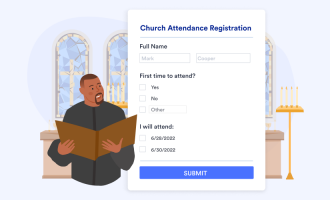Key Takeaways
- Undertake essential legal procedures, including formulating a mission statement, selecting a church name, drafting bylaws, filing necessary documents, and establishing a board of directors or church council
- Submit Form 990 annually to uphold the church’s tax-exempt status.
- Conduct a kickoff event, such as a carnival or family-focused program with a charitable component, to acquaint the church with the community and generate interest.
- Integrate versatile online donation forms seamlessly into the church’s website to refine the entire donation process.
- Customize registration forms to systematically collect attendee details, ensuring a focused and organized approach to creating memorable events.
A church is more than just a place of worship. Churches also play a central role in the community. They’re places for the young and the old to feel safe and practice their faith. Lifelong memories — moments of fun and poignancy alike — are made at churches.
Running a church is a massive responsibility as well as a deeply rewarding experience. And starting a church is daunting.
Running a church isn’t like running a traditional business — though several of the same principles of starting a business apply. You need to raise money, grow an audience, and deliver an experience that is fulfilling and worth returning for. None of these tasks is easy, but this guide is here to help.
While starting and managing a church, one of the most important things to do is stay organized. You’re dealing with lots of people and events, all of which demand careful record keeping.
In this guide, we’ll point out situations where Jotform’s online forms can come in handy. Online forms make it easier to collect and organize information — so that you can focus on instilling your congregation with lifelong memories as well as deep and abiding faith.
How to start a church: A checklist
- Gain experience as a preacher.
- Start a nonprofit and structure it accordingly. This will become your church.
- Give your church a name, a mission statement, and bylaws.
- Hire a lawyer, a finance team, and form a board of directors.
- Build your congregation.
- Develop and implement a fundraising strategy.
- Schedule meetings and church programming.
These steps are boiled down to their most simple action item. In reality, each step includes a few smaller tasks. But don’t worry: We’ll discuss each of these steps in the guide. Follow along and you’ll have your church up and running soon!
Just so you know
Receive donations, volunteer signups, and other info your church needs with Jotform’s free online church forms! Embed one in your website or share it with a link to start collecting submissions instantly!
Dealing with legal formalities and improving yourself
When is the right time to start your own church?
Starting a church is a big step. It’s not a project you can quickly knock off your to-do list. It takes time and effort and quite a bit of dedication. You have to take stock of your life, evaluate your passions, and ensure that it’s the right time in your life to begin a church. Here are a few things to consider:
- How experienced are you as a preacher? At the heart of running a church lies preaching. Your congregation will come to your church to hear your words and find comfort in their faith. Naturally, that won’t be the only thing they do at your church. But you still need to ensure your preaching will be up to par — and that you have the knowledge, faith, and experience to be an effective pastor.
- What kind of time commitment can you give? Starting and managing a church is a full-time job. You need to make sure you’re ready for the massive time commitment that comes with properly running a church. Ideally this won’t feel like work — the full days of running your church will be fulfilling because you’ll be driven by passion and faith.
- What kind of community are you in? How religious is the community around you? Are people underserved in terms of worship space? Do you think you’ll have a wide array of people excited to attend your church? These are things you need to consider. Although churches don’t exactly function like businesses, you do need to follow the basic tenets of supply and demand. If there isn’t demand for a new church in your community, you may have to reconsider your location.
- Do you have a lot of energy and passion? Running a church should be your calling — something you’ve always wanted to do. Of course, running a church (just like any other religious organization) won’t be easy. There will be arduous behind-the-scenes work that no one will see or give you credit for. But if you’re in it for the right reasons, all of this work will be worth it.
It’s hard to say if there’s ever an exact “right time” to start a church. What you really need to evaluate is whether you’re the right person — in the right phase of your life — to undertake such a massive task. Follow your heart, trust your faith, and, above all, trust yourself.
Major actions you need to take
A church is a nonprofit. That means there are a few legal steps you need to take to make sure your church is in good standing with the law and the bank. Sure, this isn’t the most exciting part of managing a church, but it’s crucially important. After following these steps, your church will be legitimate — and ready to start serving the community.
Craft a mission statement. Why are you starting a church? There might be a simple, immediate answer that comes to mind. But think a little deeper for a moment. What are the core beliefs at the center of your church? What do you want to accomplish and bring to the community? What sort of programming will you offer? Answer each of these questions and combine them into a clear, concise mission statement. Keep this mission statement at hand and let it guide your decision-making. By the way, you should also consider drafting a belief statement (or statement of faith).
Think of a name and draft bylaws. You’ll need a name for your church, not just to make it identifiable to your congregation, but also for legal documentation. You’ll also need a set of church bylaws to act as the governing principles of your church. They should be aligned with your church’s overall mission but a bit more formal. These bylaws will help you incorporate your church.
File the appropriate documentation. You need to fill out and file a variety of documents before you can start a church. Depending on your state, you’ll likely need to file a Certificate of Formation, apply for federal tax-exempt status as a nonprofit, and file for an employer identification number. Filling out these documents is fairly straightforward, though you’ll want to consult an accountant and lawyer (ideally one well versed in religious organizations, so that you would get the best possible help whenever you seek legal advice) to be absolutely sure you’re taking the correct steps.
Form your inner circle. You can’t run the whole church yourself, even if you might want to. Although you might not need or want a large staff of employees, you’ll certainly want a board of directors or church council. As with any nonprofit, these people will be legally responsible for your church. Otherwise, their role can be malleable. They’ll help with decision-making and exist as a source of authority within the church. And overall, they will be a resource: a group of trusted individuals to lean on when times get tough.
Getting excited? You should be. Starting a church is a massive undertaking, with quite a bit of legal work required in the beginning. You might even need some legal advice from professionals. But once you’re through with some of the more boring clerical work, you’ll be ready to start the real clerical work.
Just so you know
Create church forms for free with Jotform! Collect donations, prayer requests, and more from any device.
Differences between starting a church and starting a ministry
Are churches and ministries interchangeable? Not quite. There are some subtle but important differences between the two. You’ll want to be aware of them before you get your worship space up and running. To be clear, there is some disagreement over the actual differences between the two, with different people applying different definitions to certain aspects of Christianity.
A church is a legal entity. A church is a nonprofit organization with a congregation and programming. It’s literal — it has members, events, and certain legal properties. That’s why you need an employer identification number or a bank account. A ministry is more abstract. It is not always legally recognized in the same way as a church. More broadly, to “minister” means to help someone. So ministries may be more abstractly concerned with helping people. “Ministry” can often be seen as the main work conducted by a church.
Ministries are part of a church. A person who goes from place to place explaining the teachings of the Bible and evangelizing can belong to a ministry but may not belong to a church. That’s because ministry is considered the work of a church. Examples of ministries include Sunday school or Bible study. They can be run through a church and take place at a church, but they’re part of the broader Christian mission. They’re designed to create more disciples and spread biblical teachings.
Churches are more inward facing. Churches have a congregation that they are beholden to. Sure, they might have programming that brings nonmembers into the church, but they are concerned primarily with giving their members a fulfilling faith-based experience.
Ministries are oftentimes more outward facing. They may be trying to spread their faith to new communities. They also might be working to educate the population about Christ’s teachings. Although these aren’t black and white differences — and churches can also cater to people outside of the faith — this is a general distinction.
Ministries are relevant to you if you’re starting a church. After all, this is the work of your church. You’ll have ministries making up the core of what you do — the classes you run, the events you hold, and more. So be aware of these delineations while also accepting that the differences between churches and ministries are subtle and there is plenty of overlap.
Handling the church finances
The finances of a church don’t necessarily function like those of a business — even if a church is technically “incorporated.” But it never means that a church cannot open a bank account (a church has to have an employer identification number to open a bank account, though, just for the record). Churches are nonprofit organizations, which affords them a specific tax status and church directors can claim tax exemption. Here are a few things you should be aware of when handling your church’s finances.
File as a nonprofit. Once you’ve filed as a nonprofit, you will need to square aware your federal and state tax-exempt status. There are certain steps you need to take to maintain your tax-exempt status. For instance, you must not make public political stances or work on behalf of private interests. Be sure to read more about churches’ tax-exempt status on the IRS website and learn more about the application process.
Create a budget. What are your expenses? Some of these are basic and immutable, like utilities. But you’ll have to make decisions about some of your other expenses. For instance, how much are you going to spend on personnel? How much money will you need for various events? Will you spend money publicizing fundraisers? Consider these expenses, work them into your budget, and ensure you’ve designed a budget that will keep your church financially healthy.
Figure out your payroll. On the subject of personnel, how many people do you expect to work for your church, and how much will you be paying them? For instance, will you have janitors coming into your church every morning to clean? Once you’ve figured out your personnel structure, get to work using payroll software so that payment and bookkeeping is seamless.
Make it easy to collect donations. Churches thrive on donations, so making sure your congregation can easily donate is one of the best ways to ensure the financial health of your church. These donations are tax deductible, which is something your congregation should be aware of. Setting up a system that easily enables recurring donations is a great way to raise more money and make it easy for your congregants to give regularly.
Consider hiring an accountant. It can be a lot of work to handle your finances while also handling the day-to-day management of your church. To make it easier and always be sure you’re in good financial standing, you should hire an accountant. There are accountants out there particularly suited to deal with nonprofits or religious organizations, and working with one of these accountants could be the start of a rewarding partnership.
Not everyone who’s starting a church is always well versed in budgeting or other financial practices. That’s why it’s important to do your research, get educated, and never be afraid to turn to financial professionals for help.
How to become a pastor — and increase church attendance
Great preachers tend to preach to packed houses. That’s because their words resonate with people in a deep, memorable way. But you don’t become a great pastor overnight. It takes education and experience. Our blog posts walks you through the steps to the pulpit, from the seminary and beyond.
How to write a great sermon
Your congregation comes to your church for many reasons — but most often they come to hear you speak. And preachers who can consistently provide compelling sermons that inspire, move, and bring people closer to their faith will develop a loyal following. Luckily, writing a great sermon isn’t complicated. Our blog post walks you through what you should consider when crafting a sermon — from ideation to drafting to revising to delivery.
Becoming a 501(c)(3)
Are all churches 501(c)(3) automatically?
Misconceptions abound when it comes to the financial status of a church. Gaining a deeper understanding of what 501(c)(3) organizations are, how they’re taxed, and more will help you better handle the finances of your church and manage it in general.
What is a 501(c)(3)? 501(c)(3) is a section in the U.S. Internal Revenue Code that enables federal tax exemption of nonprofit organizations. Such organizations include public charities, private foundations, and private operating foundations. The IRS and U.S. Treasury enforce these rules. Most notably, donations to these organizations are tax deductible.
So is a church automatically a 501(c)(3)? A church is considered a public charity, which means it automatically is within the bounds of a 501(c)(3) organization. To remain a public charity, a church must obtain at least a third of its donated revenue from broad public support — this includes individuals, companies, and other charities. A church also needs a group of governing officials who are unrelated, such as a church council or board of directors.
How do you obtain 501(c)(3) status? In order to obtain 501(c)(3) status, you must apply to the IRS by filing Form 1023, which is the Application for Recognition of Tax Exemption. This application process will assess the basic structure and organization of your church and ensure it aligns with that of a public charity.
What things are 501(c)(3) organizations prohibited from doing? Nonprofit organizations must follow rigid guidelines in order to maintain their 501(c)(3) status. Most important, the earnings a church gathers through donations cannot benefit any director, official, or private individual. In short, no individual should be making money off of your church if you want to keep tax exemption privilege. A 501(c)(3) also cannot endorse a political candidate or intervene in political campaigns.
You don’t simply obtain 501(c)(3) status. You also must maintain it. On a yearly basis, file Form 990 with the IRS to let them know that you’re staying compliant. Making sure you’re up to par on these standards is one of the cornerstones of a properly managed church.
Just so you know
Need a more efficient way to receive donations as a 501(c)(3)? Collect them online with Jotform — and pay no additional transaction fees.
Jotform’s resources for nonprofits
As we’ve mentioned, there are quite a few forms that need to be completed before you can become a nonprofit. This can be a lot to keep up with. Online forms can help you collect the necessary information, organize it, and file it so that you’re compliant. You also can manage many of the basic activities of a nonprofit, like donation collection and charity event planning, with online forms. Here are some resources Jotform offers for nonprofits:
- Donation collection forms. Collecting donations isn’t always simple. Sometimes specific items are being donated instead of money. And keeping track of everything can turn into a headache without adequate organization.
With Jotform, you have the ability to make attractive forms that are fully customizable. So if you want to expedite the collection process and enable recurring donations, you can do so easily. If you’re holding a charity auction, include a field on your form that specifies what item is being donated and where and when it should be picked up.
- Event management forms. Are you running an event at your church? Do you want to make it easy to register and RSVP?
Jotform’s event management forms can help. Registrant information will be loaded into an easy-to-access spreadsheet so that all of your information is in one place — and you’ll get email notifications when new people sign up.
Your forms can also come in handy during the event. Jotform is fully mobile-friendly, making it easy for people to use forms to bid at a charity auction or keep track of sales, such as a charity bake sale.
- Volunteer and employee forms. Looking for volunteers for your next event? Jotform has several different forms for volunteer signups. You can even collect application information through Jotform, adding fields where applicants can answer long-form questions. Also Jotform’s file upload widgets make it easier for applicants to upload their resumes. And if you need to collect signatures, Jotform integrates with Docusign, AdobeSign, and other popular signature collection software.
Once you’ve hired volunteers or employees, you can use Jotform to make shift scheduling easy, ensuring that no one can sign up for shifts that have already been filled. This way you can avoid time conflicts and get coverage around the clock.
- Extensive blog content. Jotform doesn’t just offer helpful features. It also has plenty of blog content specifically designed for nonprofits. You’ll find fundraising ideas, case studies from successful nonprofits, and more. For instance, learn how a Seattle company raised over $20,000 for local schools. Spoiler: They got some help from Jotform’s online forms! And our guide to starting a nonprofit is a central repository for useful content that can help nonprofits raise more money and make a difference.
- Nonprofit discount. Jotform wants to help nonprofits that are making a difference in the world. Churches make a difference in the community — and Jotform doesn’t want financial considerations to get in the way of donation collection, event management, and volunteer recruitment. That’s why Jotform offers nonprofits a 50-percent discount.
Running a church isn’t easy. And Jotform understands that nonprofits have specific needs and rely on the right set of tools to succeed. From growing your congregation to planning events to managing the day-to-day, online forms can be a saving grace — and the rest of this guide will walk you through places where they can come in handy.
Build a congregation
Strategies to grow a church’s audience
No one wants to preach to an empty room. After all, if you’re starting a church (or any other nonprofit, religious organization), you’re probably excited to make a difference in people’s lives. But building a congregation takes some work. Churches can’t rely on the traditional marketing approach that businesses often use. You need to get creative and prioritize humane in-person contact. Here are a few ideas to get you off the ground:
- Get involved in the community. Churches are all about serving the community. So hit the pavement and get involved in the area where you live. Become a public face people recognize and appreciate. Whether this means volunteering at the local hospital, attending events at the public library, or supporting local businesses, getting out there in the world is a great way to raise your profile and spread the good word about your church.
- Publicize your programming. Are you starting a church softball league? Running a clothing drive for the local homeless shelter? These are rewarding events that you need to let people know about. Hanging up flyers or running commercials on local public access television are great ways to spread the message without spending much money.
- Establish an online presence. The apostles didn’t have the internet when they were spreading the word of Christ, but it probably would have helped! The internet is a great way to let the world know about the exciting things your church is doing. Publicize events, solicit volunteers, or simply let the world know that your church is a welcoming place for the community. Social media should probably be the first thing you turn to, as it is free, easy, and enables wide reach. But starting a blog or website is also a great way to gain attention for your church and broadcast important information.
- Plan a kickoff event. You need to let the community know that your church has arrived. Offering a fun event to kick things off — such as a small carnival or some family-focused programming — is a good way to get started in a fun way. And incorporating a charitable element can help people get involved for a good cause and feel good about the work your church is doing.
- Word of mouth. What do most organizations market? Typically a product or a service. Although churches do provide services, it’s not in the typical way. So you can’t be guided by the usual supply and demand marketing mechanisms. Instead, you need people to spread the word for you. And you get them to do that by providing a remarkably warm, welcoming experience in your church. Become a church people want to tell their friends and family about. You’ll be surprised to learn that a large portion of your growth will come from word of mouth.
A bustling, active church is the best kind of church. If you want a packed Sunday service, high attendance at your charity events, and a great deal of passionate involvement, follow the steps above.
Just so you know
Once you’ve built your congregation, how can you hear from them in a secure and confidential way? Receive prayer requests, volunteer applications, and more with Jotform’s free online forms.
When it comes to publicizing your church, start small
Churches are, by nature, intimate. They’re local. People aren’t taking planes or traveling for hours to attend church. Ideally they’re going somewhere within their community, among friends and family who they’re familiar with and have an affinity toward. This is part of what makes going to church such a special experience for so many. And it’s why this reality — that churches are local and community-oriented — extends to your marketing plan.
You’ll want to start small. You don’t need lots of ads online or flyers all over the city. Instead, consider starting with your friends and family. Engage an inner circle, get them in your congregation, and watch your following grow:
- Friends and family are your first go-to. They’re with you through thick and thin — so of course they’re going to be there with you at church too. Involving your family and friends in your church is a great way to start your congregation. It also fits with the principles of your church — of leaning on those who are important to you. And involving them gives them a small sense of ownership over your church. They feel like they have a hand in its infancy and its growth.
- Expand to your colleagues. If you’re coming from a previous job or know of other local pastors, don’t hesitate to invite them to your church. Of course other pastors will be loyal to their own church, but they’ll definitely want to lend a hand and visit your church. If you have friends from previous jobs, let them know about your church. Discussing religion in the workplace isn’t always easy, but if you mention your church in a warm, low-pressure way, these coworkers may be interested in visiting your church and learning more about it.
- Love thy neighbor…then invite them to church. It’s in the New Testament for a reason! Neighbors are a great source of friendship and camaraderie — and they’re also potential members of your congregation. Turning to your neighborhood embodies the Christian spirit and builds a deeper connection with your community.
As you grow your congregation, emphasize accessible programming. Everyone comes to their faith differently. Some have been going to church their whole lives; others might be new to it and less in touch with their religion. You want both of these types of people to feel welcome and heard at your church.
Maybe having Bible study classes that cater to both beginners and those who have read the Bible cover to cover is a great way for new members to learn from more experienced followers of the faith. Or organizing programming that isn’t necessarily overtly religious — like a softball league, for instance — could be a great way to build connections among members, give people an easy way to engage with your church, and establish your church as a pillar in the community.
Make it easy for people to sign up as members of your church. Jotform’s church membership form templates help you quickly gather the necessary information you need to add members of your congregation to your database. Then you’ll have their contact information so that you can keep them informed about upcoming events and ways they can get involved in your church. Don’t worry; you can customize these forms so that you gather just the information you need.
Fundraising for your church
Churches need money to stay up and running. And almost all of that money will come from donations. Because you’ll be relying on fundraising so frequently, you’ll want to come up with original, creative ideas. At the same time, you’ll want to lean on some old favorites — strategies that have worked for churches in the past and that you know will work in your situation. In this section we’ll discuss different ideas for fundraising and explain how Jotform can support your fundraising projects.
Fundraising ideas for churches
Churches have had to think up fundraising ideas for a long, long time. In this post, we’ve collected a few fundraising ideas that have helped churches in the past. Pinpoint a few that you think would be enjoyable to organize and would engage your congregation in a rewarding way.
How can Jotform fit into church fundraising efforts?
There are lots of moving parts when it comes to a fundraising project. There’s plenty of information to keep up with — from volunteer contact info to donation payment processing — and you need the right tools to collect and organize this information efficiently. Jotform has plenty of online forms that can make your life easier:
- Donation forms. Isn’t it frustrating when donation software takes a cut of your donations? You don’t have to worry about that with JotForm. Not only is Jotform a great no-fee solution, but Jotform’s online forms integrate easily with popular payment processors like Stripe and PayPal. If your church has a website, you can also embed the form onto your website so that visitors can easily donate. Here are some donation form templates to get you started.
- Event registration forms. Most churches have a busy calendar full of engaging programming. How are members of your church going to register for these events? With customized event registration forms. Collect registrants’ names, contact info, and any other information that might be helpful, such as age, gender, and some insight into what they want to get out of the event. Having this information helps you stay organized so that you can focus on developing a great event instead of worrying about making sure you have everyone’s contact information. Here are some event registration forms to get you started.
- Volunteer forms. Many hands make light work when it comes to running church events. So you’ll want a stable of volunteers to help you get everything up and running. Luckily Jotform has plenty of forms for volunteers to get involved. Here’s a form for volunteer applications. Need to collect a bit more information, such as a resume? There’s a form for that too. And once you have your volunteers, make it easy for them to sign up for shifts with the appointment slots widget, which lets volunteers know which shifts are available and which have already been taken.
- Real-time tracking. Sometimes you need to collect information urgently and in real time, such as during a silent auction. With Jotform’s mobile functionality, it’s easy to collect the information you need on the fly.
One event might need four or five different forms — from donation information to volunteer signups to participant registration. Collecting the information you need and getting it into a few easy-to-access spreadsheets makes the entire process easier. That way, you can focus the bulk of your energy on crafting an unforgettable event.
Just so you know
Raise donations for your church online with Jotform’s free and secure online payment forms for churches.
Forms specifically designed to help churches
Jotform has plenty of forms specifically designed to help churches. Here are a few of the online forms that churches have turned to time and time again:
- Choir signup form. Organizing a choir is a great way to help members get involved with the church, embrace their artistic side, and bond with other church members. And if you want to keep the choir organized, a choir signup form is a must. The form includes a vocal range section so that you can make sure you know what sort of voices you’re dealing with.
- Prayer request form. Does a member of the church want to request a prayer? Perhaps they have a loved one who is ill or they are going through some stressful life changes and want to look for comfort in their faith. This prayer request form enables them to ask for a prayer from the pastor and congregation. Customize the form if you’d like more information about the prayer or the nature of the request.
- Christening invitation form. A christening is such a special event for families, and at your church you want to make sure you’re leading christenings that are aligned with the family’s preferences. That’s why providing your congregants with a christening invitation form is so helpful. On the form, you’re able to let people know the venue of the christening, the location of the reception, and any special instructions. Giving this form to members of your church is a great way to help them out and convince them to have the ceremony and reception at your church.
- Virtual prayer form. Sometimes members of your church might want to send a prayer to a friend but can’t be there in the flesh to do so. That’s where the virtual prayer form comes in. Including this form on your website or social media makes it easier for people to empower others with their faith. You can also have these prayers directed to you or another official in your church, and then you can put them on letterhead and send them to the recipient to make the prayer extra special.
Just because churches have been around for nearly two millennia doesn’t mean they can’t use modern technology. Jotform’s online forms make it easy to expedite data collection and gather information in a way that’s seamless and assistive.
How to manage a church
Churches, even small ones, need organization
Your church is just starting out. And in the beginning, you’ll likely have a pretty small congregation and a calendar that isn’t exactly overflowing with events. In the beginning you might also be frustrated by the lack of donations. Be patient. You’re starting small, and things are still in the early going.
That said, it’s never too early to get organized.
Your small church needs organization in the same way that a Joel Osteen megachurch does — just on a slightly smaller scale. You have members, volunteers, -possibly- board of directors, donation tracking, and events to worry about even in the beginning. And getting in the habit of staying organized is one of the best ways to ensure the continued success of your church. After all, you’re a preacher. You want to worry about building strength through faith. You don’t want to worry about keeping records.
Pro Tip
Online church forms can help you. And in this section, we’ll walk through even more ways Jotform can come in handy when managing the day-to-day tasks of your church.
Church management software systems
You can’t do it all alone. By design, churches are nonprofits that aren’t exactly overflowing with resources. You’re relying on the goodness of others — so you likely can’t afford a massive staff to help with administrative work. Luckily, there’s church management software out there that can help you.
Other than donation collection, how can Jotform help you manage your church?
In the following sections, we’ll explore some of the ways Jotform can come in handy for things beyond donation collection. After all, your church doesn’t exist just to drive donations. It’s designed to make a difference in the lives of its congregation. Here are a few places where Jotform can help:
- Events and retreats. If members of your congregation are traveling with your church, you’ll need a lot of planning to make it all come together. This is where forms can help out. And for any event, such as a charity auction or bake sale, having forms to get everything squared away can take a lot of stress off your shoulders.
- Competitions. These are an underrated way to engage your church — and they require plenty of setting up. From registering entrants to hiring volunteers, Jotform can come in handy along the way.
- Bible camps. These camps are popular for a reason. They engage the young people of your worship space in a hands-on, memorable way. But there are lots of moving parts when it comes to running a camp, and having a lot of online forms can make sure everything functions smoothly.
- Baptisms. Baptism is a life-changing event — make sure the application and invitation process is smooth by using forms.
Read on to see the actionable steps that can get you up and running with the necessary forms for the above situations.
Managing church camps
Sometimes the most fulfilling church experiences happen outside the walls of your church. Camps and retreats are a great way to get a change of scenery, explore new places, and establish opportunities for connection among the members of your church. They’re also one of the best ways to get different demographics within your church involved. You can have camps for young children, retreats for older individuals, or parent-child adventures.
Youth camps are a popular choice for a reason. They engage young people with their church, getting them out in the world so that they can practice their faith in an exciting, hands-on way. Youngsters also get to meet new friends and be with people their own age in a comfortable environment. So many attendees of youth camp make memories that last a lifetime — and these are memories they carry with them as they grow and continue to practice their faith.
A camp also takes a great deal of organization. You have to keep track of registration, find volunteers, and have donation machinery in place that enables you to run fun events like summer camp. You may even seek legal advice from time to time. There are additional considerations to keep in mind. For instance, maybe you need to keep track of children’s food allergies because you’ll be eating on the trip. Or maybe the attendees will get T-shirts for the retreat, and you need to know their clothing sizes.
Jotform offers several form templates that can help you start and manage your camp. Here are a few that stand out:
- The general camp registration form helps you collect nearly all of the necessary information in one place. Customize the form to meet your needs. And if you want to use a registration form specifically designed for Christian camps, you have that option as well. These forms make it easy to collect any payments that might be needed as well as emergency contact information from registrants. You can also collect parental consent in a snap.
- Running a camp for adults? Jotform has a template specifically designed for that. The form includes large text fields where you can include medication information, allergy information, and other necessary medical history that should be known before the camp commences.
- Want to ensure you get the best camp counselors possible? Jotform’s extensive library of employee application forms will certainly come in handy. Jotform also has forms that can help you evaluate your staff so that they know what areas they’re performing well in and where they can improve.
There are a lot of forms to collect when running a camp. From parental consent to permission slips to necessary medical information, you’ll have a lot to keep track of. Why not keep it all in one place, in an easy-to-navigate spreadsheet? With Jotform, that’s your reality. And you can also receive email notifications as forms are filled out so that you can keep track of registration.
Vacation Bible school
Young people are just learning their way around their faith. As they mature, they’ll learn more and more about how they relate to their faith and their fellow churchgoers. This is a special time where young people need to be invited into the church with a welcoming, open-minded tone.
A major part of this process is educating these children about their religion. This involves learning about religious history and — most notably — the Bible. The Bible will be the thing they turn back to throughout their religious lives, and they may carry the lessons they learn about the Bible while they’re young with them throughout their lives.
The Bible is not always an “easy read.” And any parent knows how hard it can be to get their child to read. That’s why churches like to find ways to make Bible school more exciting. Oftentimes, that involves getting out of the classroom and into the world. Learning about the Bible amid nature or in a new environment brings added power to the Bible’s teachings — and it helps children learn biblical lessons in a lasting, unforgettable way.
Jotform provides all sorts of forms to help organize and run your vacation Bible school:
- Instead of a paper signup sheet, use a vacation Bible school registration form. This makes registration easier for both parents and church staff.
- When taking care of children, no matter their age, you want to be aware of everyone’s health status. Are there medications certain attendees need to take? Are you dealing with any allergies or chronic illnesses? Medical history forms are the ideal way to collect this information.
- It’s important to get parental consent before any programming that involves minors. These forms are a good way to get the information you need — which ideally includes some emergency contact information so that you know who to reach out to.
- If you need to collect money to cover expenses, you’ll want to consult Jotform’s vast store of payment collection forms. Popular payment processors like PayPal and Stripe can be integrated into your forms.
Managing baptisms and christenings
Baptisms and christenings are a huge part of the Christian religion. They’re an important, sacred introduction to the faith. They are also beautiful, memorable ceremonies that bring people together around their faith. And your church can be the site of these moments. But in the same way you plan for a birthday or wedding, you need to plan for a christening. And if you’re the church hosting the baptism or christening, you’ll need to stay organized.
Here are some online forms from Jotform that can help you when planning a baptism or christening. Some of these forms can be distributed to members of your congregation to make their planning process stress-free.
Generic baptism form. This form enables people to apply for a baptism. It asks for their basic contact information, then gives them some space to discuss why they want to be baptized. It’s a straightforward, organized way to keep track of applications and introduce people to the faith in an efficient, effective manner.
Baptism scheduler. Once an application has been reviewed and you’re ready to move forward with a baptism, send the individual the baptism scheduling form. It gives people the chance to select a date and shows them the dates that are available so that you can avoid time conflicts and get everyone baptized in a timely manner and on a schedule that works for your church.
Christening invitation form. Once a family has decided to have a christening at your church, distribute this form to your congregation so that people can RSVP. There is also a space for special instructions if more information needs to be added.
Christenings and baptisms are part of what makes churches feel so special to so many. These are events that stay with people for a lifetime — and they happen under your roof. Ensure you use the resources at your disposal so that you can plan and execute these events with care.
Managing competitions
Churches can be a venue for certain special events and competitions. These events can raise money for the church or for a cause close to a congregant’s heart. Possible ideas include charity 5Ks, swimming competitions, baking contests, or other forms of competition. The decision is yours.
During the planning process, you’ll need forms to help with registration, donations, and other informational materials. Jotform has the templates you need to make setup a breeze. Here are a few that stand out as particularly helpful:
- 5K run registration form. Organizing a 5K is a great way to raise money in a fun way. 5Ks are short enough that you can attract runners from a variety of skill levels. People can even walk the five kilometers and raise money in the process. This form helps you collect the information that you need so you can get off to the races.
- Swimming competition enrollment form. Swimming is one of the best types of exercise you can do. And organizing a swimming competition is a great way to get your congregation active for a good cause. These competitions are particularly fun during the summer when everyone can gather outside and watch the contestants take to the water. This enrollment form will be a good way to easily sign up individuals who are interested in competing.
- Photo contest form. It’s not all about physical activity. You also have a bunch of church members who are artistically inclined, and a photo contest is a great way to engage them. You can even theme your contest and give it a faith-based purpose. This photo contest form helps people easily submit their stunning work so that they can be reviewed by a panel of judges.
- Art competition form. Maybe instead of photography, you have artists in your church who are skilled with a paintbrush. Run an art competition to engage their creative juices and have your entire congregation vote on the winner. Help them submit their work through this form.
- Singing competition form. Move over, American Idol. It’s time to pluck some of the best singers from your choir and get them to face off in a thrilling charity singing competition. Have each entrant pick their favorite religious song — anything from a hymn to a Christian rock song — and gather the church to crown a winner!
- Dance competition registration form. It’s time for your church members to show off their moves in a dance competition. These contests combine art and physical activity…and may lead to a few laughs if a contestant has two left feet. Have your brave dancers sign up for the competition through this form.
Competitions at your church bring people together and engage your congregation in a new and exciting way. They also raise money for a good cause. So the next time you’re planning a competition, be sure to seek out an online form that can help with administration.
Managing volunteers
We’ve discussed how important it is to have volunteers to help you out with the day-to-day administration of your church. If you’re planning events or running retreats, you’ll want some volunteers on hand to assist you.
But there’s quite a bit that goes into securing volunteers. You’ll need a thorough vetting process to ensure you’re working with people who share your vision and are upstanding members of the church. Here are some forms you’ll want to use through this process:
- Volunteer application form. A thorough application process is a good way to ensure you find the right talent. Of course, this is a volunteer position, so you don’t exactly get to be very choosy. But you still want to collect the right information so that you can weigh your volunteer options and keep all applicants’ information on file.
- Background check form. If your volunteer efforts are a bit more involved, you’ll probably want to run a background check. This gives you some insight into a volunteer’s work history so that you can be sure they’re someone you want working with your church.
- Simple time sheet. Keep track of the shifts and hours your volunteers are signing up for and showing up for. This simple time sheet puts all of your time keeping in one place so that you can stay organized and cover all of the necessary shifts.
- Job satisfaction form. Are your volunteers getting something out of the work they’re doing with your church? Ideally they should be. And if not, they can voice their concerns and preferences in this job satisfaction form. Then you can work to design a volunteer experience that suits their needs.
Your volunteers become part of the family at your church. And these forms help you find the right people, collect the necessary consent forms, and ensure your volunteers are finding value and satisfaction in the work they’re doing with you. Happy volunteers are one of the first steps toward a happy church.
Reviving a dying church
How to know if a church should be revitalized
A church revitalization is a major effort. Before you take one on, you’ll want to make sure the church in question is a good candidate for revitalization. Here are a few things you should consider:
- What condition is the building in? Some buildings are unfortunately beyond repair. Problems with the foundation or piping system can call for major repairs that might be out of your budget or simply not worth it. And demolishing a church to build a new one is an expensive, time-consuming undertaking.
If the building is in fairly good condition and mostly needs superficial tune-ups, this church is a great candidate for revitalization. Hiring a contractor for the more involved fixes, and then handling the rest on a DIY basis is a great way to get the church building in better condition.
- Is this church located in a vibrant community? A worship space isn’t worth revitalizing if no one is going to attend it — plain and simple. So before starting on a church revitalization effort, take note of the community where the church is located. If it’s not a particularly populated or religious community, you may have a tough time getting the church off the ground.
Keep in mind that a community that might be a bit run-down does not make it a less-than-ideal candidate for a newly repaired church. That community — whether it’s economically depressed or recovering from a natural disaster — might be particularly empowered and motivated to get involved in the church. In this way, revitalizing the church may help revitalize the community as well.
- Do you have the resources needed to revitalize this church? Even if a church in need of revitalization is in OK condition, you’ll still need to sink a lot of resources into the restoration efforts. Take stock of the resources at your disposal. Do you have a winning fundraising strategy in mind that can help you raise the necessary funds? Do you know contractors and other professionals who can help you and support you throughout this effort? And do you have adequate knowledge of what makes a church successful, which you’ll need to revitalize a church effectively?
Revitalizing a church is a massive decision. Make sure you assess both the church you’re considering revitalizing and your own status in life before embarking on this journey. And keep in mind that after the work — after the time and sweat and energy that goes into it — you’ll come away having introduced or even reintroduced an important setting in the lives of churchgoers. Take this responsibility seriously and give it your all.
What’s the difference between church revitalization and church planting?
How did the church you’re standing in actually come to be? There are all sorts of ways churches come into existence. Church revitalization is a major source of new churches.
A church revitalization can involve taking an older congregation and incorporating it into a new one. Then there’s church planting, which is a different process altogether. Let’s walk through some of the differences between these approaches.
What is church planting? In its simplest form, church planting is the process of establishing a new church. Church planting has been happening for nearly two millennia, since the very early days of Christianity. It has continued ever since, and there’s even been a fairly recent effort to encourage more church planting.
What is the process of church planting? There are a few different ways churches can be planted, varying based on the situation and context:
- If an existing church splits, the factions might go off to plant their own new churches.
- A family or individual might move to a new area and start a church from scratch. This is known as the “parachute method.”
- A “mother church” might provide resources so that a “daughter church” can be started. Younger pastors might go off to lead the new church.
- A selection of separate religious communities — perhaps run out of homes — might come together to form their own worship space together.
How does church planting differ from church revitalization? A church revitalization renews a previously existing church. No “new” church is made in the process — it is more like a new edition of a previously existing church. In that sense there’s a subtle but notable difference between church planting and church revitalization. Revitalization can also be called “church development,” which again differs from church planting, as that involves creating a new worship center that will be incorporated into an existing congregation.
New churches are rising up all the time — and no two take the same path to existence. No matter how they’re made, churches go on to be important places of worship and fixtures within the community.
Jotform is here to help churches
Churches have needs. Jotform has solutions. Whether it’s event planning, a donation drive, recruiting new volunteers, or something else entirely, online forms can make the administrative process as smooth as can be.
Taking on the management of a church is a noble and involved endeavor. You shouldn’t be spending your time bookkeeping. Jotform helps you spend less time on administrative details and more time making a difference in the lives of your congregation and the people in your community.
Pro Tip
And Jotform wants to make it easy for churches to start using Jotform’s solutions. That’s why nonprofits — which churches, of course, qualify as — get a special nonprofit discount on Jotform’s paid plans. Get started today!


























Send Comment:
17 Comments:
245 days ago
Let's do this
More than a year ago
Dear author,
This article is time consuming and very tough to keep everything in mind. Having said that, it's worth the time spent reading, very informative and very practical in advice. Thank you. I appreciate you.
More than a year ago
Thank you for the material, it's helpful for all ministers
More than a year ago
Thanks for good information
More than a year ago
I'm highly bless with this article , may almighty God reward the writer amen.
More than a year ago
thank you so much, the material has been so helpful.
More than a year ago
it has been helpful going through your site i need more on church management and church administration
More than a year ago
I give this article a five Star. I have been tremendously blessed Reading through everyline. I am now more than ready to begin this long awaited vision of starting a church. The guides are excellently articulaires. God bless you...
More than a year ago
I like pelantion of churches
More than a year ago
Very interesting. So how does a church fit into a parent organization? Based on this article each building requires it's own EIN. Or, does it? I tried joining an organization once but could accept donations without my own EIN which made me a unique entity. The IRS is less than helpful with these things.
More than a year ago
The information very helpful, thank you very much I appreciate it
More than a year ago
Very nice guide
More than a year ago
Please do not follow this plan. It totally leaves out God. Read the Book of Acts to see how the church started. You must be fully committed to following Christ and leading others to do so. As others come to Christ, you meet regularly for worship, fellowship, Bible study and prayer. You also train them to lead others to Christ. This article makes it seem like you are opening a Taco Bell franchise.
More than a year ago
I am a Ugandan and was blessed so much to go through how to start and grow a church.I was blessed so much and this was very helpful for me as I think of planting churches in my community.
I will always continue to learn more as there is alot to learn.
Thanks for putting up this information for people like us to access to.God blkess and please pray for us as a family as we take on this noble calling on our lives.God bless.
More than a year ago
thanks very Much! this is excellent guide in starting a Church. God bless you abandantly
More than a year ago
Dear brothers and sisters in Christ,
I want to start by saying how wondrous I feel after finding this glorious guide!
I am from Atlanta, Georgia and I loved going to church every Sunday to share the magnificent glory of Jesus with the leadership of Pastor James, who I have been faithfully followed over 25 wonderful years.
Sadly he retired 3 years ago, after his retirement, I just didn't feel that I am a good fit with the new pastor, I also tried out a new church but unfortunately, that didn't do me any good either.
I have many friends with whom I shared the same values and opinions, last year we have started discussing starting our own church and the idea thrilled us all immediately.
I knew, from the start, that this wasn't going to be an easy road as nothing is in God's glorious world and you have to work hard on your path. I started doing exhaustive research both online and with my congregation. This guide laid every single detail out very easily understandable and action-ready.
Now I am extremely proud that how far we came in our path, we are preparing to open our church before Christmas.
Thank you for this post, and God bless you all!
More than a year ago
it is great,,answered prayer because am planning to plant a church in the next few months.thank you for the insights.god bless you.